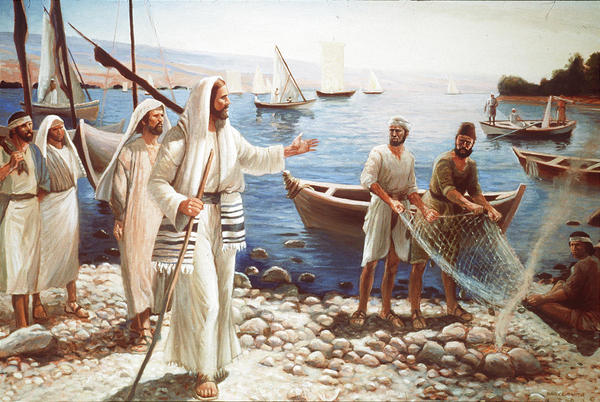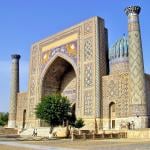
(Wikimedia Commons public domain image)
Coincidentally, with LDS General Conference approaching and two vacancies to be filled in the Council of the Twelve, this first-century journalistic account of the calling of the first apostles has just surfaced:
As we reported in this newspapyrus three months ago, the controversial preacher from Nazareth known as Rabbi Yeshua recently established his headquarters in the Galilean fishing town of Capernaum. Now, in a further development, he has announced his choice of twelve leaders to head up a new religious organization intended to propagate his views.
Response from critics to those chosen, however, has ranged from disappointment to mocking dismissal and even indignant anger.
“The ‘apostles,’ as they’re being called, are virtually all backwater Galileans like Yeshua himself,” observed Caiphas of Jerusalem. “He missed a real opportunity with these choices.” “Where’s the diversity?” asked Bar Kosiba, a prominent authority on new religious movements. “Shouldn’t these men, who are supposed to direct international missionary efforts for the Yeshua operation, look like their intended audience? This strikes me as an absolutely epic fail. At the very least, Yeshua’s choices represent a striking lack of imagination on his part.”
“They’re supposed to ‘go into all the world,’” remarks Caiphas, “but they have no language qualifications, and they’re exactly the opposite of ‘cosmopolitan.’”
“And if this is really supposed to be a worldwide religious movement,” asked Bar Kosiba, “why does the number of these so-called ‘apostles’ so obviously reflect the twelve tribes of Israel? For all its pretensions, we’re seeing a very small-town Jewish mentality here.”
“Underwhelming,” agreed the noted wonderworker Simon Magus. “As the governing board of a movement with global aspirations and world-historical pretensions, this new body of leaders is undeniably, even painfully, provincial. It’s not clear that any of them have ever even traveled more than a few miles from their native villages.” “The Yeshua movement,” he added, “began as an insignificant, provincial, rural Galilean sect, and it’s obvious now that it will die precisely as it began. And almost certainly very soon.”
Some observers commented positively on the choice of Judas Iscariot, who, as a Judean, represents the only non-Galilean among the new leadership. “Yeshua got the proportions exactly backwards,” remarked Gaius Caligula Bacchus. “Ideally, if he wasn’t going to think beyond the horizons of Palestine, there should at least have been eleven Judases and only one Galilean.”
Others have called attention to what they termed the “inbreeding” between the twelve chosen leaders. Simon Peter, who will apparently chair the group in the absence of Rabbi Yeshua, is the brother of Andrew—and both of them are involved in the commercial fishing industry with the brothers James and John, principal figures in the dried-fish exporting firm Zebedee and Sons. Additionally, some reports suggest that James, the son of Alphaeus, may be the brother of Judas Thaddeus as well as of, perhaps, even Matthew (sometimes called Levi). And unconfirmed sources indicate that Simon the Zealot (aka Simon the Canaanite) could be a cousin of Yeshua himself.
“I couldn’t be more satisfied,” quipped Marcus Twanius, “if the entire Zebedee family fishing outfit had officially endorsed Yeshua’s claims!”
“It seems,” says Bar Kosiba, “that these quite undistinguished men weren’t chosen so much by ‘revelation’ as by ‘relation.’”
Although the selection of Judas Iscariot has drawn praise from certain circles, that praise has not been unanimous, because both Judas and his fellow “apostle” Simon the Zealot have long-standing reputations for political extremism. “If Yeshua wants his movement to prosper in a Roman world, under the Pax Romana,” commented Pontius Pilate, “this was certainly an inauspicious beginning. We’ll be monitoring the situation closely.”
Moreover, some observers predict disharmony for the new body, wondering how well the two anti-Roman agitators Judas Iscariot and Simon the Zealot will actually be able to work, over the long term, with Matthew (aka Levi), who has for years reportedly earned a comfortable but notorious living as a tax collector for the Romans and their client states.
“Where are the women?” demanded Calpurnia Livia. “Yeshua promises enormous power, not only to lead his movement but to heal all kinds of diseases and to expel demons. But he gives this supposed power only to males. Do women not count in his worldview? These appointments indicate what can only be described as a savage misogyny, a frank and unashamed contempt for women—who, after all, constitute at least half of his disciples, if not a much, much higher proportion. Evidently, the Yeshua movement is going to be merely yet another religious boys club.”
Others, notably Professor Dionysius Exiguus, call attention to the lack of theological training among the new leadership of what he derides as “Yeshua Inc.” None of the “apostles,” he points out, seems to have received any formal scribal or legal education. Instead, they appear to have been chosen for their business acumen. With regard specifically to Peter, James, John, and Andrew, however, Dionysius remarks that running a commercial fishing venture is nothing like leading a religious movement. “You can’t fish for men,” he says. “And mending nets scarcely qualifies anybody to mend souls. Anyone expecting depth from this conspicuously shallow group of rustics would be better advised to search for it in the Sea of Galilee.”












